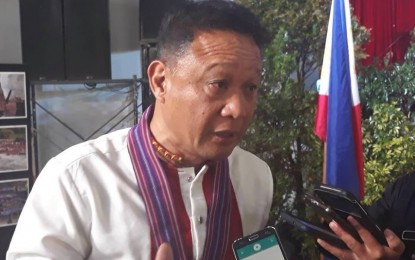
LIVELIHOOD FOR IPs. Department of Tourism Undersecretary Marco Bautista discusses the benefits of the department’s agri-tourism project on the sidelines of the 21st year celebration of the Indigenous Peoples’ Rights Act of 1997 in Baguio City on Tuesday (Oct. 30, 2018). The project will benefit small farmers and Indigenous Peoples communities in the country. (Photo by Pamela Mariz Geminiano)
BAGUIO CITY -- The Department of Tourism (DOT) is setting its sights on the development of farm and eco-tourism sites in the region to provide income for small farmers and Indigenous Peoples (IP).
“The tourism industry provides great opportunities for diversification of income for small-scale farmers and IP organizations,” DOT Undersecretary Marco Bautista said in an interview with the media on the sidelines of the 21st year celebration of the Indigenous Peoples’ Rights Act of 1997 here last October 30.
Bautista, a native of Abra province, said that farm and eco-tourism open up a new perspective of livelihood, especially for IP groups, towards an inclusive and sustainable economic development.
He lamented that despite its bountiful natural resources and diverse cultures, the Philippines still lags behind its neighboring countries in terms of farm and eco-tourism sites.
Bautista said the Cordillera region is rich in natural resources that can be used to the fullest.
“Farm and eco-tourism are very important here in the region, since Cordillera has a lot of natural resources, especially for the IP community, who are the ones who will really benefit from this,” he explained. "This is why we envision farm tourism as a community rejuvenation. This is what we are pushing for, really beneficial for the IP community."
Bautista said the convergence program among the DOT, Department of Agriculture, and local government units should be intensified so that IP communities and small farmers would help develop the agri-tourism program.
In the past years, he said, the DOT and the Department of Public Works and Highways had been implementing the tourism-road convergence project, constructing a tourism road network that leads to tourism sites in the various localities, including barangays with tourist spots.
Earlier, Senator Cynthia Villar encouraged farmers in the region to venture into farm tourism, as this would benefit them hugely, such as in terms of higher income and free education, and ultimately give the country food security.
The DOT-Cordillera has acquainted highland farmers with the new concept of farm tourism, which officials described as actually fun.
Jovita Ganongan, officer-in-charge of DOT-Cordillera, defined “fun farm tourism” as an activity that allows tourists to have an experiential activity on farming by providing orientation, which encourages farmers to venture into an activity more than just producing, but also sharing the experience.
Ganongan said the farmers will not just focus on productivity, but they will also come up with tourism activities in their farms, providing tours for their tourists, and educating them on how to do farming.
Despite the farm tourism concept being new to the IP community, the DOT has accredited two farm tourism sites -- the Cosmic farm in Benguet, and the Layug farm in Mountain Province.
"There are so many things to be done. Everyone should work hand in hand to achieve sustainable development for our IP community and small-scale farmers," Bautista said. (PNA)
